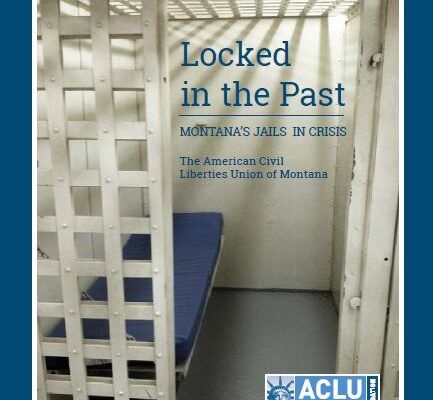In many ways, county detention centers bear the brunt of a broken criminal justice system.
Many county detention centers in Montana have severe conditions issues and are underfunded, inadequately staffed, and largely ignored by county commissioners, county law enforcement departments, and the public. An inadequately funded statewide public defender system, a broken bond system, a lack of pre-trial alternatives to incarceration, and a backlogged Montana Department of Corrections all mean that more prisoners are staying in county detention centers for longer periods of time. Counties’ unwillingness or inability to create and fund jail diversion programs puts the burden on county detention centers to house criminally charged individuals, many of who would be better monitored in less restrictive and less expensive settings. Many prisoners have drug or alcohol addiction issues, mental health issues, medical needs, or developmental disabilities. Counties expect detention centers to be a psychiatric hospital, emergency room, and drug rehabilitation clinic all in one, but do not provide the resources to address any of these issues. The result is an inefficient and ineffective system that is unable to provide the treatment and rehabilitation to stop people from repeatedly cycling through the criminal justice system.
Addressing these issues in county detention centers and providing efficient and effective pre-trial alternatives to detention must become a high priority for counties across the state.
Locked in the Past: Montana's Jails in Crisis, the ACLU of Montana's comprehensive report of the conditions in Montana jails, reports out on our findings.
"Montana’s detention centers are in crisis. Outdated facilities, inadequate staff, overcrowding, insufficient medical and mental health care, and an overwhelmed criminal justice system are status quo,” said ACLU of Montana Executive Director Scott Crichton. "The consequences of these factors can be devastating to individuals and costly to our communities. Given the financial constraints many counties experience, meaningful jail and criminal justice reforms are not only morally justifiable, but also financially necessary."{C}
The report identifies several trends in county jails:
- Overuse of solitary confinement for people with mental illness
- Inadequate numbers of detention staff
- Lack of access to fresh air
- Lack of access to natural light and exercise
- Inadequate medical and mental health care
- Overcrowding
- Lack of basic necessities such as underwear, socks, and bras
- Unconstitutional visitation prohibitions for minors & non-family members
- Lack of access to law libraries
- Inadequate or unworkable grievance procedures
- Incurable physical plant issues in antiquated facilities
Several factors led the ACLU of Montana to investigate conditions in county detention centers. With over 1,000 county detention center beds in Montana and increasing lengths of stay for pre-trial detainees, the number of complaints the ACLU receives from prisoners in county detention centers has mushroomed. Concurrent with increasingly grave complaints from prisoners, the ACLU has observed an unacceptable level of jail suicides for many years. Rather than re-evaluate the county detention system, reform the broken bond system, and consider addiction and mental health treatment and incarceration alternatives, counties throughout the state are building bigger detention centers. For the most part, county detention issues are “out of sight, out of mind” for the general public, despite the enormous amount of tax revenue spent on incarceration. It follows that detention is often a low priority for elected county commissioners. The lack of any central agency overseeing county detention centers made gathering information very difficult. As such, in 2012, this initiative was launched to gather that information on a county-by-county basis.

